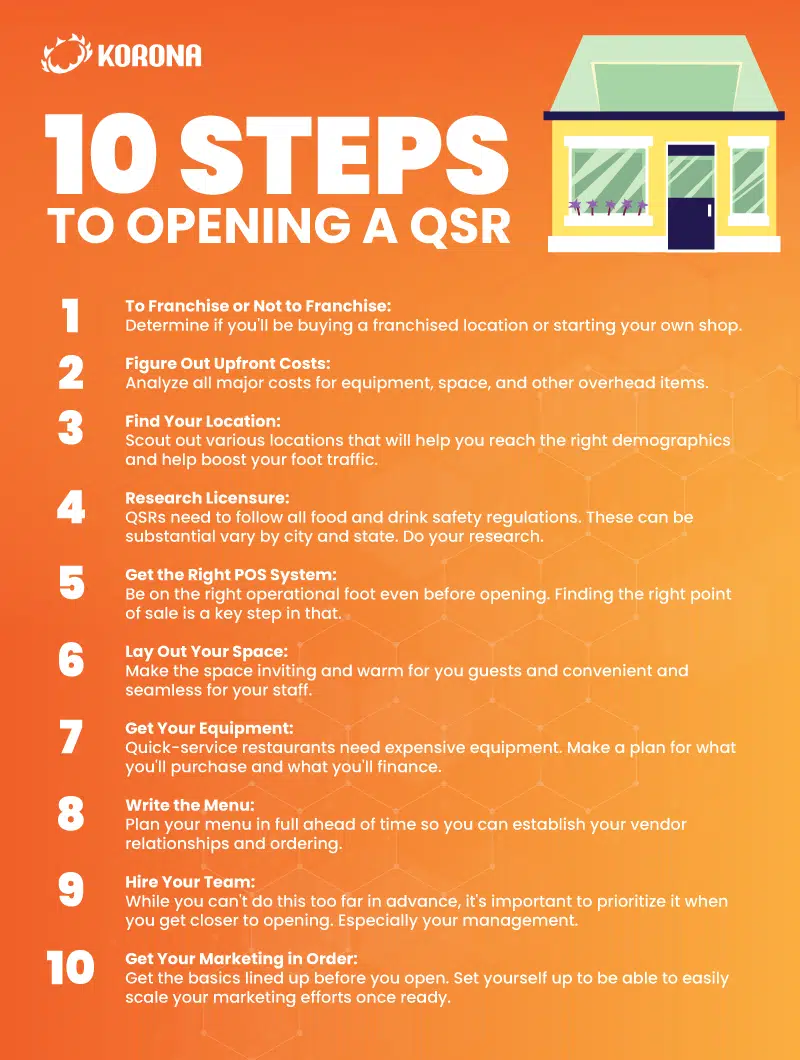Fast-casual or quick-service restaurants are popular types of businesses for budding entrepreneurs. Often, they are members of a franchise, making them appealingly proven business opportunities. And while the upfront costs may be substantial, it’s likely to bring a solid return on investment.
But how to open a quick-service restaurant business? There are some general issues to consider that will apply to any business owner. But there are also some specifics that fast-casual owners must especially consider.
What Is a Quick-Service Restaurant?
Also known as a QSR or fast-casual restaurant, a quick-service restaurant is any place that serves food items and/or drinks in a short time period.
QSRs are also often large chains or franchises. The relatively simple business model makes it easy to duplicate and scale. Many of the most popular brands are QSRs, from pizza and burgers to boba and burritos.
While QSRs do offer some flexibility in what you serve, they must maintain a certain simplicity in operation, allowing the food to be prepared and served promptly.

1. Determine If You’ll Buy a Fast-Casual Franchise
First and foremost, entrepreneurs must do their research beforehand. Determining if you’ll be starting your own business or purchasing a franchise location is important.
Buying a franchise is the easiest way to get started for many looking to get into the QSR business. Franchises come with various resources and procedures, like a franchise POS system and marketing materials, that will minimize the growing pains of any new business.
But others seeking more autonomy and creative freedom will find starting your own independent business a better fit. It may require more work but will allow you to pursue a more unique establishment.
2. Calculate Upfront Costs
Like any new business, it will be critical that you compose a coherent business plan with a breakdown of expected costs and revenue once you’re open, including an emergency fund if things don’t go quite as planned.
For QSR owners looking to join a franchise, determine your management plan and any additional marketing you’ll employ once you operate.
If you’re starting your own business, you’ll need to focus more on what defines your brand, your target audience, and your products. Here, it will be important to differentiate yourself from your competitors and stand out.
3. Scout Out a Location
When it comes to fast-casual restaurants, location is everything. You’ll likely be counting on a high transaction volume, so you’ll need it to be convenient for your customers. This might also involve a drive-thru or pickup window. Look for spots allowing you to run a smooth and efficient operation.
Additionally, your location should bring in new shoppers on foot. Getting your QSR in an area with high foot traffic will help you introduce your brand to new consumers and grow your customer base more quickly.
Your product will also drive the decision for your location. You’ll likely target specific demographics depending on what types of food and drink you offer. Of course, you must consider this when making your location decision, too.
4. Get All Licenses
Food and drink establishments face some of any business’s strictest health and sanitation regulations. It’s vital for QSR business owners to be fully compliant and up-to-date with all licensing requirements, insurance, permits, and health/sanitation standards.
For those businesses that also serve alcohol, the regulations will be even more substantial. You’ll need a liquor license and, in many states, individual certification for each employee.
Check with your local city hall to determine which licenses and permits your business will need once operating.
5. Purchase a QSR POS System
Every new business must find the right operational software before opening. QSRs are no exception.
Start with your QSR POS. This tool is the hub of all business operations, from ordering and inventory to transactions and customer loyalty programs. Many new business owners don’t spend enough time considering their point of sale and fail to understand what a critical piece it is for your long-term success.
For franchises, the point of sale software is even more important. You’ll need it to communicate with all other locations to help calculate royalty payments, optimize ordering, run sales reports, and more.
Get started with KORONA POS today!
Explore all the features that KORONA POS has to offer with an unlimited trial. And there’s no commitment or credit card required.
6. Plan Your Quick-Service Restaurant Space
Floor space is critical for how restaurants operate and must be considered before opening your doors. If you’re in a popular area, especially one with lots of foot traffic, it’s almost guaranteed that business real estate is quite expensive. For most businesses, making efficient use of your space and minimizing your lease or mortgage costs is a high priority.
First, ensure the space in your quick-serve restaurant caters to a fluid operation behind the counter. You need it to be conveniently operational for your team to promptly and effectively serve your customers. Take all major equipment into account when planning this, too.
But you’ll also need to plan the other side of the counter. Will you have table service? Determine how many guests you can serve and plan your seating area. Most QSRs still have a dine-in seating area, though more are exclusively moving to the take-out/delivery model.
7. Buy Your Equipment
Equipment will be a major decision and cost for starting a new fast-casual establishment. Plan for exactly what you’ll need ahead of time.
- Dishwasher
- Stove top/grill
- Hood/vent
- Oven/speed oven
- Low-boy refrigerators
- Walk-in refrigerator
- Storage
Some more niche QSRs will need additional equipment, but this list covers some of the basics. Know what you’ll be buying ahead of time and think about ways to finance equipment that you don’t have the capital for.
8. Create a Menu
Next, plan your menu. This is the easiest part of this list if you’re opening a franchise location. If you’re opening your own new quick-service spot, this is probably the hardest part of this list.
For the latter folks, you likely already have a concept and general idea of your menu items from when you submitted your business plan. But once it gets closer to your grand opening, you must have your menu ready, vendors picked out, inventory managed, and orders in place.
Remember to keep your price point in line with your target audience. Strategically pricing menu items will increase sales and help guarantee return customers.
9. Staff Your QSR
Another step is the hiring process. Hiring too far in advance is impossible, especially in the service industry, because employees need a reliable paycheck. But starting a month or two out is a good idea. This way, new team members can give proper notice of their past jobs and get trained for their new ones.
Spend time looking for the best job candidates. This involves preliminary research and planning and taking the job interview process seriously. With workers demanding higher wages and the labor shortage, giving this aspect extra time and thought is important.
10. Begin Preliminary Marketing
Finally, start your marketing plan. You already know your location and target audience. Now it’s time to implement some basic QSR marketing strategies to start getting your name and brand out there.
- Set up a Google My Business page and all relevant social media accounts.
- Look into advertising through Yelp, Google, Bing, and any review sites.
- Create free profiles wherever you can.
- Build and maintain a fast and sleek website.
- Dive into local advertising opportunities to reach the relevant audience.
Remember, start small with each and see what works. You can also ramp up the time and money you spend down the road to improve your QSR business.













